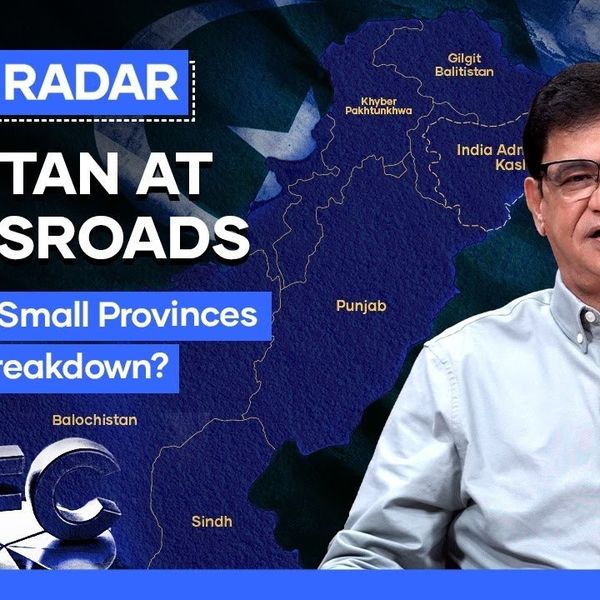Khan’s party turned to SIC to safeguard ‘political space’, Pakistan’s top court told
Supreme Court of Pakistan continues review of reserved seats ruling, adjourns hearing until Friday for further arguments from SIC lawyer

Asma Kundi
Producer, Islamabad
Asma Kundi is a multimedia broadcast journalist with an experience of almost 15 years. Served national and international media industry as reporter, producer and news editor.

A lawyer representing the Sunni Ittehad Council (SIC) told Pakistan’s Supreme Court on Thursday that leaders of Imran Khan’s Pakistan Tehreek-e-Insaf (PTI) aligned with the SIC to “protect their political space” amid alleged political pressure following the 2024 general elections.
The statement, made by senior lawyer Hamid Khan, came as the court resumed its review of a ruling that awarded reserved parliamentary seats to SIC after PTI-backed independent candidates joined the party post-election.
The legal dispute stems from the Election Commission of Pakistan’s (ECP) decision to deny reserved seats to SIC, citing procedural lapses -- specifically, the party’s failure to submit a list of candidates ahead of the polls. That ruling was initially upheld by the Peshawar High Court.
However, in a judgment issued in July 2024, the Supreme Court overturned the decision, ruling that SIC was entitled to the seats -- a move it said reflected “the will of the people.”
The SIC, a religious-political party with limited parliamentary presence before 2024, rose to prominence after dozens of PTI-backed independents joined its ranks following PTI’s disqualification from contesting under its electoral symbol. This affiliation allowed PTI-supported candidates to regroup under a formal party platform and claim entitlement to reserved seats.
The Supreme Court's July ruling is now under review through petitions filed by the ECP, the Pakistan Muslim League-Nawaz (PML-N), and the Pakistan People’s Party (PPP). An 11-member top court’s constitutional bench is hearing the case.
The hearing
During the hearing today, Hamid Khan pointed out that the post-election political realignment had forced PTI-backed independents to join SIC to secure their political future.
"Our candidates were harassed, even threatened with abductions. We had no choice but to affiliate with SIC to protect our political space,” Khan said, underscoring the coercive environment that led to this realignment.
Khan further elaborated that the delay in the general elections and the subsequent loss of PTI’s party symbol - ‘cricket bat’ - had left the party unable to contest under its own banner. “This situation created a political vacuum, leaving many PTI-backed candidates with limited choices but to join SIC for survival in the political arena.”
Justice Aminuddin Khan acknowledged that the court had granted PTI more relief than expected, while Justice Jamal Mandokhail noted, "Even your leader said the relief was more than anticipated.” However, Khan remained critical of the court’s approach, saying, “Given the history of this court, we weren’t expecting justice. This court has swung both ways -- right and left.”
ECP's 'constitutional overreach'
Senior lawyer Salman Akram Raja, representing PTI-backed candidates, argued that the crux of the case revolves around the interpretation of Article 94 of the Constitution and the legitimacy of the ECP’s decision.
Raja contended that the ECP acted beyond its constitutional powers by denying SIC its due share of reserved seats, especially after the Supreme Court had already recognized PTI as a parliamentary party.
Justice Hashim Kakar commented, “A question remains a question until it is answered,” reinforcing the importance of Article 94 in resolving the case. Raja argued that the ECP’s decision to deny SIC the reserved seats contradicted the court’s prior recognition of PTI’s political standing.
Raja also emphasized that the ECP had made its ruling at the last minute, just before the elections, leaving PTI candidates with no option but to contest as independents. He argued that this created a vacuum in political representation, which the court needed to address.
Hamid Khan also revisited the controversy surrounding PTI’s intra-party elections and its subsequent loss of the party symbol. He accused the judiciary and the ECP of unfairly targeting PTI compared to other parties, such as the Awami National Party (ANP), which he claimed had been given more leniency despite procedural lapses.
“We held intra-party elections, but were penalized for having a better constitution,” Khan argued, highlighting a perceived double standard in how political parties were treated.
The hearing, which has been adjourned until Friday, June 27, 2025, will continue with Khan presenting further arguments on behalf of SIC.










Comments
See what people are discussing